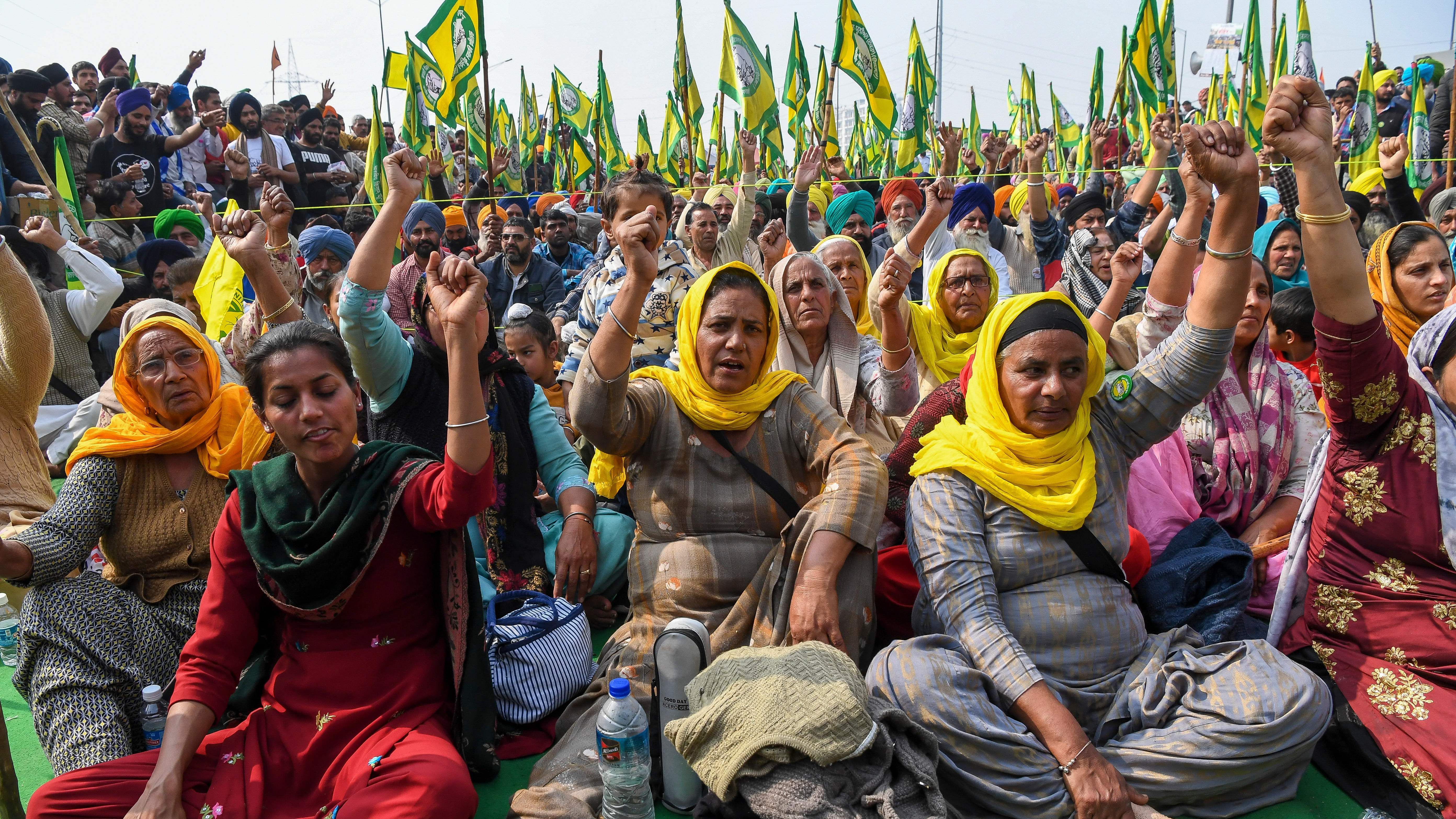India's Farmers Have Been Protesting New Agriculture Laws for Months—Here's Why
Farmers and agricultural unions are demanding the immediate repeal of three new laws passed in September.


Content warning: Police brutality; suicide.
Well into their sixth straight month of striking and protesting, farmers in India continue to demand the repeal of three recently passed agricultural bills that they believe prioritize corporate interests over their own. The protests began in August when the three bills were first unveiled and have continued to grow exponentially as the bills were passed in September. The government has repeatedly refused to grant the demands of farmers and agricultural unions in subsequent meetings.
The protest, at its core, reflects global issues of workers' rights and labor regulations and the Indian government's treatment of the protestors has begun to veer dangerously into human rights violation territory, but it still has not been covered widely outside of India (even as people around the world have hosted their own protests in solidarity). That changed, however, when the peaceful protests turned violent at the end of January. On Jan. 26, India's Republic Day, farmers hosting a planned rally drove their tractors into Delhi's city center and stormed the capital's historic Red Fort, where they clashed with police armed with tear gas, batons, and assault rifles. According to the BBC, one protestor died and more than 300 police officers were injured in the clash; more than 200 protestors were subsequently detained, as were eight working journalists, per Human Rights Watch.
In early February, after the Indian government was reported to be restricting internet access in the areas around the ongoing protests, global activists like Rihanna began using their platforms to signal-boost the farmers' cause.
why aren’t we talking about this?! #FarmersProtest https://t.co/obmIlXhK9SFebruary 2, 2021
We stand in solidarity with the #FarmersProtest in India. https://t.co/tqvR0oHgo0February 2, 2021
A post shared by Meena Harris (@meena)
A photo posted by on
As the protest nears the six-month mark, the government shows no sign of accepting the protestors' demands and therefore has all but ensured their continued civil disobedience. Here's a primer on the ongoing conflict.
What sparked the farmers' protest?
The farmers' protest is centered around conflict over three pieces of agricultural legislation passed in September by India's Parliament with support from Prime Minister Narendra Modi. According to PRS, a nonprofit Indian legislative research institute, the three bills decrease trade regulations on farmers' goods, allow for online and interstate trading, enable farmers and buyers to enact exclusive contracts, and limit the government's ability to regulate the supply of essential commodities.
The bills were presented by Modi and other legislative supporters as giving farmers more freedom to control their own trade and expand their own markets. The farmers, however, argue that the increased competition enabled by this deregulation will give corporate buyers, rather than agricultural workers—who make up nearly 60 percent of India's population—all the power. Since the buyers will have access to a wider pool of suppliers, they'll therefore be able to drive down prices, a phenomenon further compounded by the bills' removal of government-imposed minimum prices for certain goods, which farmers say were already only barely helping them scrape by.
Since the protests started in August, ahead of the bills' passage, dozens of protestors have died from severe weather conditions, health conditions such as heart attacks, car accidents while approaching the protests, and suicide, according to Al Jazeera.
Stay In The Know
Get exclusive access to fashion and beauty trends, hot-off-the-press celebrity news, and more.
What do the protestors want?
In short, a complete repeal of the three acts. Representatives from more than 30 agricultural unions that oppose the bills have met with government officials in 11 rounds of talks, to no avail. Officials have invited the farmers to participate in mediation, negotiation, and amendment of the laws, but the farmers have refused, citing their demand that the bills be repealed outright.
"The government has the sharpest of brains working for it. The fact that they've not been able to come up with a proposal which meets our demands means that our case is strong," Kiran Vissa, a union member and a leader of the protests, told The Wire in December, noting that merely amending any of the bills would nullify the others. "So the only way the demands can be met is by a complete repeal of the laws. The government has refused to look into the nature of our demands in a substantive manner."
The nation's Supreme Court issued an order in mid-January suspending the bills and appointing a committee to oversee future negotiations, The Guardian reported. The protestors continued to stand by their request for a total cancellation of the legislation, rather than an unsatisfactory compromise, with leaders reportedly saying, "Now is not the time for a committee."
In response to the suspension order, Bhog Singh Mansa, President of the Indian Farmers Union, echoed Vissa's sentiments. "A stay is not a solution. We are here to get these laws scrapped completely," he told the Business Standard. "The government has in a way already agreed to scrap the laws when it said it is willing to incorporate as many amendments as farmers want."
What has the government said and done?
In the most recent round of talks on Jan. 22, the government said its best offer was a suspension of the bills for up to 18 months, which the farmers once again rejected, as it doesn't meet their explicit demands. After hitting this roadblock, per The Print, the groups have yet to schedule their next round of talks.
In earlier talks, government officials said they had reached a consensus with the protestors on the issues of decriminalizing necessary controlled fires and dropping a provision that increased power tariffs—though, once again, they stopped far short of agreeing to completely repeal the laws. Officials have labeled this refusal to accept anything less than repeal a sign "that these leaders are not going for a solution—they are continuously wanting to create a movement against the government," Gopal Krishna Agarwal, a spokesperson for Modi's Bharatiya Janata Party, told The New York Times.
Throughout the months of protests, supporters of the laws have also claimed that the farmers simply do not understand their provisions, with Modi reportedly blaming the protests on a misinformation campaign by the opposition party. However, the lack of tangible results from the 11 rounds of talks, plus growing evidence of misinformation being spread by the bills' supporters, prove that the protests are based not on a misunderstanding, but on a fundamental disagreement over the rights and treatment of agricultural workers.
Additionally, on Jan. 26, after the Republic Day violence, the interior ministry announced that it was suspending mobile internet services in several districts surrounding Delhi, where hundreds of thousands of farmers have been camped out for months, the BBC reported. The shutdown was supposed to last only for a few hours, but has been repeatedly extended each day, according to CNN, with officials claiming that the internet shutdowns—essentially cutting off the farmers' ability to share and receive information—was "in the interest of maintaining public safety and averting public emergency."
What's next?
With the bills' supporters continued refusal to accept the farmers' demands of total repeal, and no further talks on the schedule, it seems likely that the protests will stretch on for weeks, if not months, though many of the farmers may choose to return to their farms when planting season begins in March.
"We are not going back—that is not in our genetic code," Ringhu Yaspal, a protestor camped outside of Delhi, told The New York Times in the days after the Republic Day clash. "Agriculture has turned into a slow poison. It's better to die fighting here."
Also in the camps, Jagtar Singh Bajwa, a farm leader, told an assembled crowd, "We should not give a message that we are tired, that we are going home," according to the Times, adding, "We will start over today, with full unity."
Andrea Park is a Chicago-based writer and reporter with a near-encyclopedic knowledge of the extended Kardashian-Jenner kingdom, early 2000s rom-coms and celebrity book club selections. She graduated from the Columbia School of Journalism in 2017 and has also written for W, Brides, Glamour, Women's Health, People and more.
-
 The Royal Family Easter Rule Kate Middleton Broke in 2018
The Royal Family Easter Rule Kate Middleton Broke in 2018The Princess of Wales was pregnant with her third child—Prince Louis—at the time.
By Amy Mackelden
-
 Tracee Ellis Ross Reflects on "Grief" Over Not Marrying or Having Kids
Tracee Ellis Ross Reflects on "Grief" Over Not Marrying or Having Kids"I grieve the things that I thought would be and that are not."
By Amy Mackelden
-
 A "No-Fly Zone" Has Been Placed Over King Charles's Home
A "No-Fly Zone" Has Been Placed Over King Charles's Home"It prompted a security scare."
By Amy Mackelden
-
 36 Ways Women Still Aren't Equal to Men
36 Ways Women Still Aren't Equal to MenFeatures It's just one of the many ways women still aren't equal to men.
By Brooke Knappenberger
-
 How New York's First Female Governor Plans to Fight for Women If Reelected
How New York's First Female Governor Plans to Fight for Women If ReelectedKathy Hochul twice came to power because men resigned amid sexual harassment scandals. Here, how she's leading differently.
By Emily Tisch Sussman
-
 Why the 2022 Midterm Elections Are So Critical
Why the 2022 Midterm Elections Are So CriticalAs we blaze through a highly charged midterm election season, Swing Left Executive Director Yasmin Radjy highlights rising stars who are fighting for women’s rights.
By Tanya Benedicto Klich
-
 Tammy Duckworth: 'I’m Mad as Hell' About the Lack of Federal Action on Gun Safety
Tammy Duckworth: 'I’m Mad as Hell' About the Lack of Federal Action on Gun SafetyThe Illinois Senator won't let the memory of the Highland Park shooting just fade away.
By Sen. Tammy Duckworth
-
 Roe Is Gone. We Have to Keep Fighting.
Roe Is Gone. We Have to Keep Fighting.How To Democracy always offers a path forward even when we feel thrust into the past.
By Beth Silvers and Sarah Stewart Holland, hosts of Pantsuit Politics Podcast
-
 The Supreme Court's Mississippi Abortion Rights Case: What to Know
The Supreme Court's Mississippi Abortion Rights Case: What to KnowThe case could threaten Roe v. Wade.
By Megan DiTrolio
-
 Sex Trafficking Victims Are Being Punished. A New Law Could Change That.
Sex Trafficking Victims Are Being Punished. A New Law Could Change That.Victims of sexual abuse are quietly criminalized. Sara's Law protects kids that fight back.
By Dr. Devin J. Buckley and Erin Regan
-
 My Family and I Live in Navajo Nation. We Don't Have Access to Clean Running Water
My Family and I Live in Navajo Nation. We Don't Have Access to Clean Running Water"They say that the United States is one of the wealthiest countries in the world. Why are citizens still living with no access to clean water?"
By Amanda L. As Told To Rachel Epstein